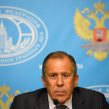
Lavrov Unilaterally Reinterprets the Armistice Agreement With Ukraine
Publication: Eurasia Daily Monitor Volume: 12 Issue: 16
By:

German Chancellor Angela Merkel had hoped to see the Minsk armistice process rehabilitated at the “Normandy Group’s” January 21 meeting in Berlin (see EDM, January 22, 23). Prefacing that meeting of the German, French, Russian and Ukrainian ministers of foreign affairs, Merkel declared: “The Minsk agreement remains, of course, the basis for talks. All partners, including Ukraine and Russia, continue adhering to the Minsk agreement, and I hope that this will remain so” (Bundeskanzlerin.de, January 21).
That statement overlooked the evidence that Russia had de facto scuttled the September 2014 Minsk agreements soon after their signing (see below). But, even as Merkel was grasping at straws in Berlin, Russian Foreign Affairs Minister Sergei Lavrov overtly reneged on the Minsk armistice terms, in a public statement in Moscow. This move not only pre-determined the Berlin meeting’s failure, but pushes the “Normandy process” to the brink of irrelevance.
Lavrov used the familiar techniques of: 1) setting new or extraneous preconditions to Russian implementation of the signed agreement; 2) unilaterally imposing a certain sequence in addressing various stipulations over time, thus postponing Russian compliance with the core of the agreement indefinitely; and 3) misquoting the agreement’s wording, with a sense of impunity reflecting Russia’s military supremacy in the conflict theater.
Lavrov was speaking at his start-of-year press conference, his traditional net-assessment review of Russian foreign policy. Ukraine, and the Minsk armistice agreement specifically, featured front and center in his remarks (Interfax, RIA Novosti, January 21, 22).
First, he introduced a new political conditionality, implying that it would take precedence over the existing armistice terms: “Today’s most urgent priority, unquestionably, is the launching of a direct dialogue among all political forces in Ukraine, so as to discuss and agree on the country’s constitutional structure.” This allusion to Ukraine’s “federalization” is standard fare, but the matter is not a part of the armistice agreement in any conceivable way. Lavrov is now linking it to Russia’s implementation of the armistice agreement, as a new pretext for stonewalling on implementation.
Lavrov misquoted the Minsk armistice agreement as, in his own words, “envisaging a special status for the territories of the proclaimed Donetsk and Luhansk people’s republics.” In fact, the agreement (September 5, 2014) never mentions those “republics” or their “territories.” Moscow, meanwhile, demands negotiations on a “special status” (so as to legalize the secession process) while dragging out the negotiations on the unfulfilled military terms of the armistice.
Russian and proxy forces currently control a 300-kilometer section of what is legally the Ukrainian side of the Russia-Ukraine border. The armistice agreement envisages securing that border under monitoring by the Organization for Security and Cooperation in Europe (OSCE). Lavrov, however, is setting a chain of preconditions to perpetuate the existing situation: “To determine who shall control the full length of that border, and in what ways, will only be possible after a final political settlement [of the conflict], and after the fulfillment of yet another part of the Minsk armistice, namely granting the Donetsk and Luhansk people’s republics a guaranteed special status, as well as security guarantees to the political structures representing these territories. Kyiv must adopt such a legal act.” These are preconditions to Russia’s merely discussing the matter of securing that border.
Meanwhile, Russia is inviting the OSCE to negotiate border-monitoring arrangements with the two “people’s republics.” According to Lavrov, “the matter of OSCE border monitoring can be resolved even now, if the OSCE is interested. Let the OSCE negotiate with those who are currently in control of the border-crossing points on the Ukrainian side.” This formulation stops short of an open repudiation of Ukraine’s sovereignty; but at the same time proposes arrangements to prevent Ukraine from exercising that sovereignty and empowering the secessionist authorities instead.
None of this should have come as a surprise. Russia had overtly derailed the Minsk armistice agreements during the OSCE’s year-end meeting in Basel. There, Lavrov claimed that the armistice clauses should be implemented according to a certain sequence, in a serial order that Moscow purports to determine itself. He listed the serial order as: recognition by Kyiv of the November 2 elections in two “people’s republics,” enactment of a Ukrainian law on special status for them, re-establishment of economic links by Kyiv with those two “republics,” and a political dialogue between Kyiv and their leaders (Interfax, December 5, 2014; see EDM, December 16, 2014).
Since mid-January, Russian and proxy forces have resumed offensive military actions against Ukraine. They seek to consolidate the gains already achieved beyond the armistice line; compel Kyiv to accept those losses de facto; and further devalue the Minsk agreements, to the point of forcing their re-negotiation.




